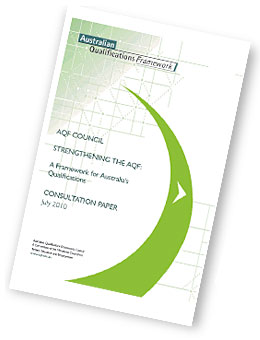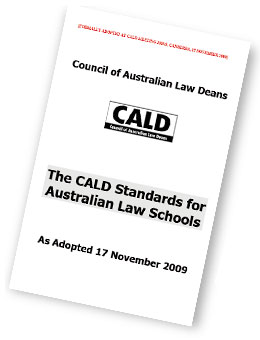FEATURE ARTICLE -
Issue 44 Articles, Issue 44: Oct 2010
The Federal Government intends evaluating graduate learning outcomes against academic standards.
This paper describes the work of the Learning and Teaching Academic Standards Project in Law in facilitating the development of Threshold Learning Outcomes for the Bachelor of Laws by the judiciary, the profession, regulators, educators and students.
Earlier this year, the Federal Labor Government announced the creation of a new quality and regulatory agency based on recommendations stemming from the Bradley Review of Higher Education. Before the election, the Labor government began the establishment of the Tertiary Education Quality and Standards Agency (TEQSA). Given bi-partisan support, work on the formation of TEQSA seems likely to continue with a view to having the Agency fully operational from 2012.
 TEQSA is to evaluate the performance of institutions and their programs of study against a range of standards criteria. These criteria will include those set out in the Australian Qualifications Framework which is currently under revision.1 They will also be aligned with the academic standards that discipline communities nationally agree represent the core minimum or ‘Threshold Learning Outcomes’ (TLOs) for their graduates. In the case of Law, these standards will be part of determining what law students should know, understand and be able to do on graduation.
TEQSA is to evaluate the performance of institutions and their programs of study against a range of standards criteria. These criteria will include those set out in the Australian Qualifications Framework which is currently under revision.1 They will also be aligned with the academic standards that discipline communities nationally agree represent the core minimum or ‘Threshold Learning Outcomes’ (TLOs) for their graduates. In the case of Law, these standards will be part of determining what law students should know, understand and be able to do on graduation.
The Australian Government awarded the Australian Learning and Teaching Council (ALTC) $2 million to lead the Learning and Teaching Academic Standards (LTAS) project which involves facilitating and coordinating discipline communities’ definition of these academic standards in preparation for the creation of TEQSA. The project is driven by Discipline Scholars across a number of broad disciplinary groups. We — Sally Kift and Mark Israel — have been appointed by the ALTC as joint Discipline Scholars: Law. Together with Rachael Field as Project Officer, we started on this project in February and report to the Department of Education, Employment and Workplace Relations in December.
 Of course, Law already has Standards developed for other purposes. In November 2009, the Council of Australian Law Deans (CALD) agreed a set of Standards for Australian Law Schools.2 The purpose of the CALD Standards was “to enhance the quality of Australian law schools in all of their diverse endeavours, and to do so by assisting all Australian law schools to strive for and reach a clearly articulated set of standards” (Coper, 2008). As a result of the work carried out on the CALD Standards, Law was in a relatively strong position to start the LTAS project. While the CALD Standards are all-encompassing, the LTAS work is concerned only with the ‘curriculum content’ aspect of them (at 2.3.2 and 2.3.3).
Of course, Law already has Standards developed for other purposes. In November 2009, the Council of Australian Law Deans (CALD) agreed a set of Standards for Australian Law Schools.2 The purpose of the CALD Standards was “to enhance the quality of Australian law schools in all of their diverse endeavours, and to do so by assisting all Australian law schools to strive for and reach a clearly articulated set of standards” (Coper, 2008). As a result of the work carried out on the CALD Standards, Law was in a relatively strong position to start the LTAS project. While the CALD Standards are all-encompassing, the LTAS work is concerned only with the ‘curriculum content’ aspect of them (at 2.3.2 and 2.3.3).
In the LTAS project, we are producing a statement of six TLOs for the Bachelor of Laws. These deal with: knowledge; ethical disposition; thinking skills; research skills; communication and collaboration; and self management. We have sought to develop TLOs that are clear, flexible and have legitimacy. They should make it possible for those responsible for the Bachelor of Laws degree to meet concurrent requirements from the Australian Government, the professional Admitting Authorities, the Council of Australian Law Deans’ proposed Law Schools Standards Committee, and from individual universities. We have also drawn on relevant developments in parallel processes in the United Kingdom (Quality Assurance Agency for Higher Education Benchmark Statements), Europe (Tuning), Latin America (Tuning) and the standards developed by the American Bar Association.3
The Role of Standards
While there are a range of reasons for the project, its value for Australian law graduates should be that they can demonstrate more easily to prospective employers inside and outside Australia that they have a particular base of knowledge, understanding and skills. It would, of course, be open to and sensible for graduates to indicate that they have additional knowledge and skills and for particular law schools to make more advanced claims about all their graduates.
The project should offer some help for law schools involved in curriculum reform projects. Standards, after all, should not mean standardisation and should not unduly restrict law schools’ autonomy nor impede their efforts to develop the curriculum for the Bachelor of Laws and innovate in terms of delivery. Several institutions have already indicated that they are using the Draft TLOs as a starting point to help map coverage of those skills and areas of knowledge across the curriculum.
Standards also have a role to play in protecting the tertiary education sector as a whole. In a 2009 discussion paper,4 the Australian Universities Quality Agency (AUQA) argued that the Standards agenda would underpin expansion in domestic and international student numbers and enhance both equity and excellence in higher education. AUQA concluded: “Higher education’s strategic importance to Australia’s economic and social prosperity makes it imperative that our institutions have robust strategies for demonstrating students’ academic achievement” (p.4).
Consultation
The Threshold Learning Outcomes are being developed through a process of consultation with law academics, regulators, professionals, judges and students across the sector. Our Expert Advisory and Discipline Reference groups include representatives from the judiciary, the Law Admissions Consultative Committee (LACC), CALD, the Australian Academy of Law (AAL), the Law Council of Australia (LCA), COAG Standing Committee on Legal Practice and Relations with the Legal Profession, Australasian Law Teachers Association (ALTA), Australian Law Students Association (ALSA), Young Lawyers Committee, and the Australasian Professional Legal Education Council (APLEC).
In June, we ran a National Forum in Melbourne for university Associate and Assistant Deans with responsibility for learning and teaching in law. Almost 40 academics attended, drawn from nearly every Australian Law School. Later that month, we met with the Law Admissions Consultative Committee in Melbourne to brief them on the project and receive feedback on an early draft. We have provided regular briefings to CALD and ALTA and are running focus groups in the Northern Territory, Queensland, and Western Australia in order to gather responses to the proposed TLOs from students and recent graduates.
 How you can be involved
How you can be involved
Over September and October, we have been conducting a process of local consultation across Australia for legal academics, interested students and members of the profession. Hubs are being or have been run in Adelaide, Brisbane, Canberra, Darwin, Gold Coast, Hobart, Melbourne, Perth, Sydney, and Wollongong. The sessions have been organised to inform the discipline community about the project, and seek feedback to support drafting of the final statement. An additional teleconference is planned for 15 October for those unable to attend a face-to-face meeting. Invitations have been distributed through Law Schools, Admitting Authorities, Law Societies, Bar Associations and Courts. Further information about venues and dates may be found on our website5 and we invite you to join us at one of these sessions.
In July, we circulated a third draft of the Standards Statement to Law Schools, Law Student Associations, Admitting Authorities, Law Societies, Bar Associations and courts in each jurisdiction and invited comment. You are welcome to be involved in providing feedback. Again, you can find both the Consultation Paper and the Feedback form on our website.
In most cases, consultations to date have ended with a broad acceptance that the discipline-based standards need not be very detailed as long as guidance on how to interpret each TLO was contained in a non-prescriptive and evolving set of Notes. These Notes will contain information about the provenance of each TLO, an exploration of the terminology used in the TLOs, and could evolve to provide examples of the TLOs’ implementation in terms of demonstrating students’ achievement. The project also aims to contribute material to a peer-reviewed repository of useful resources to provide practical assistance to discipline academics regarding standards implementation and measurement. We have started to list contributions under ‘Resources’ on our website.6 If you are aware of other useful resources, please alert Rachael Field r.field@qut.edu.au. It would be extremely helpful if you could either provide a link to the webpage (url) or a digital copy.
We remain convinced that the Academic Standards that are being developed by the discipline community are preferable to any that might be imposed from outside. The LTAS project provides a significant opportunity for legal academics, professionals, regulators and students to contribute to the creation of meaningful learning outcomes for the Bachelor of Laws. We thank all of those members of the profession and the judiciary who have already taken a keen interest in our work and invite all members to contribute if they wish.
Mark Israel is an ALTC Discipline Scholar and Winthrop Professor of Law and Criminology and Associate Dean in the School of Law at University of Western Australia. Sally Kift is an ALTC Discipline Scholar, and Professor in the Faculty of Law, Queensland University of Technology. Rachael Field is a Senior Lecturer in the Faculty of Law, Queensland University of Technology.
You can find out more about our work at http://www.altc.edu.au/standards/disciplines/law, and we can be contacted at sally.kift@altc.edu.au, mark.israel@altc.edu.au or r.field@qut.edu.au.
Mark Israel, Sally Kift and Rachael Field
Footnotes
- http://www.aqf.edu.au/Portals/0/Documents/Strengthening%20the%20AQF%20-%20Consultation%20Paper%20July%202010.pdf
- http://www.cald.asn.au/docs/CALD%20-%20standards%20project%20-%20final%20-%20adopted%2017%20November%202009.pdf
- See http://www.altc.edu.au/standards/disciplines/law/resources#precedents
- http://www.auqa.edu.au/qualityenhancement/academicstandards/
- http://www.altc.edu.au/standards/disciplines/law
- http://www.altc.edu.au/standards/disciplines/law/resources






 How you can be involved
How you can be involved